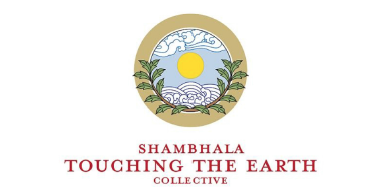Friday
Community ArticlesGratitude
By Emily Takahashi
An excerpt from the Shambhala Touching the Earth Collective November 2024 Newsletter
My friend Irene asked if I would write something about gratitude, in honor of the season of Thanksgiving. My first thought was, what could I say that hasn’t been said about this simultaneously simple and profound human attitude? I don’t know about you, but it was not commonplace when I was a kid to verbalize what we were thankful for at Thanksgiving. That seems to be a more recent development. These days there are seminars, webinars, blogs, books, and meditations, on the importance of gratitude, not just once a year, but as an everyday practice. For some, it is a morning ritual to think of 10 things to be grateful for before getting out of bed.
As soon as you say the word gratitude, the body softens a little, the heart tenderizes, and the mind wanders toward those gifts we value so deeply: family, friends, teachers, community, pets, fall colors, blue skies, rivers, food on the table, any amount of good health, even time itself. The lists can be long and just reflecting on them for a moment can shift our perspective markedly. The mental and even physical health benefits of gratitude are well documented. Giving thanks can be as much a part of one’s self-care routine as taking a supplement or getting good exercise.
All this is a wonderful trend in a world that often appears to be collapsing on systemic levels. And perhaps, there is even a correlation between the level of dis-ease we experience in so many spheres of life with a corresponding need to reflect on gratitude. It is easy to feel gratitude when things are going our way (cue “Oh What a Beautiful Morning”). But what about when things are not?
I write this just days before what feels like the United States’ most critical election, perhaps ever. The outcome of this election will not just affect Americans, but will have ripple effects throughout the world. What will the role of gratitude be if the outcome is not how I want it to be? And it feels like the world just got darker? No matter what happens, we are facing unprecedented levels of uncertainty. Not exactly an easy time for a relaxed sense of gratitude.
Gratitude shares the same root as the word gratis, which means “free.” Maybe it’s a stretch to say that gratitude can be a portal to freedom, but, on the other hand, maybe not. If my gratitude is not conditional on the set up of external conditions, am I not, in theory at least, free? Free to appreciate life, no matter how it presents itself?
The New Yorker recently published excerpts of the prison diaries of Alexei Navalny, the Russian dissident. He spoke about how he practiced “prison Zen,” mentally preparing for the worst and accepting it, so he could endure—a kind of positive hopelessness that allowed him not to be dependent on things turning out in his favor (which they didn’t). With that shield against despair, he was nonetheless able to rejoice. He had not compromised his principles, his commitment to his voters, his dignity, even his sense of humor, no matter how brutally he was treated. For that, he was able to say, on his last birthday:
“I want to thank all the people I’ve met in my life. The good ones for having helped and [who are] still helping me. The bad ones for the fact that my experience with them has taught me something. Thanks to my family for always being there for me! But the biggest thank-you and biggest salute I want to give today goes to all political prisoners in Russia, Belarus and other countries. Most of them have it much harder than me. I think about them all the time. Their resilience inspires me every day.”
It’s hard to imagine anyone being in a worse situation than Navalny in terms of external conditions, but he had learned to practice an unconditional gratitude that allowed his internal conditions to remain aligned with all that he believed in, and with what felt like inherent goodness. Such a lesson for challenging times!
We are reminded of the fabled Buddhist monk, who chased by a tiger, jumps off a cliff, preferring the rocks below to being mauled. However, he is caught halfway down on a vine, where he discovers a plump, juicy strawberry growing right before his eyes. He promptly picks the strawberry and pops it in his mouth, savoring its flavor.
Come hell or high water, there is always a strawberry of gratitude growing somewhere. Can we savor it?
***
To read the complete issue of the Shambhala Touching the Earth Collective November 2024 Newsletter please click here.








